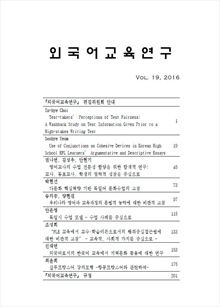간행물
외국어교육연구 Foreign Language Education Research

- 발행기관 서울대학교 외국어교육연구소
- 자료유형 학술지
- 간기 반년간
- ISSN 1229-5892 (Print)
- 수록기간 1998 ~ 2018
- 주제분류 사회과학 > 교육학 사회과학 분류의 다른 간행물
- 십진분류KDC 705DDC 405
권호리스트/논문검색
제7호 (2004년 12월) 4건
1.
2004.12
구독 인증기관 무료, 개인회원 유료
Recently, the use of corpus has been very popular in almost a11 areas of language research, as a means of exploring the actual patterns of language use. The rnain goal of this paper is to show the possibilities of and advocate exploiting corpus for English language education. For this goal, it first provides a basic understanding of corpus by describing the types of corpus, issues in corpus design, and the use of a concordancing prograrn in analyzing corpus. This is fo11owed by the discussion of three different ways in which corpus can contribute to English language education. First, the content of English teaching can be improved by the rnore accurate and detailed description of the target language that is provided by corpus-based research. Secondly, corpus analysis itself can be adopted as a language teaching methodology, in which learners discover various facts about English by thernselves. Fina11y, analysis of learner corpus can help us diagnose and solve the problems that the learners typica11y have.
8,700원
2.
2004.12
구독 인증기관 무료, 개인회원 유료
The purpose of this paper is to value the intercultural communicative competence model in English language assessment. As for intercultural communication, it becomes of utmost importance that (1) the inappropriateness of the conventional communicative competence models be demonstrated, and (2) altemative models from interculturally communicative needs be proposed and their use defended. Qualitative methodolgy and narrative inquiry are needed to make the assessment of intercultural communicative competence press forward in Korea.
5,100원
3.
2004.12
구독 인증기관 무료, 개인회원 유료
This paper examined the usefulness of widely used foreign language tests in Korea, focusing on their purposes. The analyses of secondary data showed that the tests are used for purposes for which they have not been validated, which call into question the appropriateness of interpretations test users make of test scores. The results also indicated that the reliability of test scores could be undermined because of test security violations. Finally, the lack of correspondence of test tasks and real life tasks also question the meaningfulness of the interpretations that test users make on the basis of test scores. Even though the present study was only exploratory in nature, its findings are hoped to contribute to an understanding of the usefulness of language tests for a given purpose.
4,600원
4.
2004.12
구독 인증기관 무료, 개인회원 유료
In Germany, there is a lack of tests such as TOEFL and TOEIC. Many think that the individuality of students is ignored in such standardized tests. Multiple choice tests are criticized in Germany for the same reason. And Germans also think the evaluation form based on behaviorism is overused. Each province in Germany has its own system to control the Abitur of Gymnasium which is necessaη to gain the admission to universities. Students take examinations in each subject for the Abitur in the final year of high schools. The examinations are composed of diverse forms including subjective questions and sometimes multiple choice questions which are used only if necessary. Zertifikat Deutsch was developed in the 1960s and Test DaF has been used since 2001. Tests must be based on the principles of objectivity, reliability, and validity. Evaluations should follow the goal and the curriculum of education. Subjective, objective, and semi-subjective questions should be mixed. Tests themselves should not be the object of teaching, but just tools to improve students' abilities. Tests should raise students' motivation, let them consider their own ability, and help them to choose their ways of leaming. This paper suggests further that evaluation forms of German education in Korea should be systematized. A German level test that examines grammar, vocabulary, and the four functions of language should be developed. It must be closely related to the goal, quality, and levels of German education both in high schools and universities. The level test would be possible through the cooperation of organizations, Education Ministry, public institutions such as German societies and Goethe Institut. Databases of grammar, vocabulary, and the four functions of language could be built for each level of the test. This database should be helpful in teaching German and editing German textbooks as well. The test could also be acknowledged as an official German proficiency test and used for the entrance to undergraduate, graduate schools, jobs etc. The quality of German education will be improved through this consolidation.
5,800원

